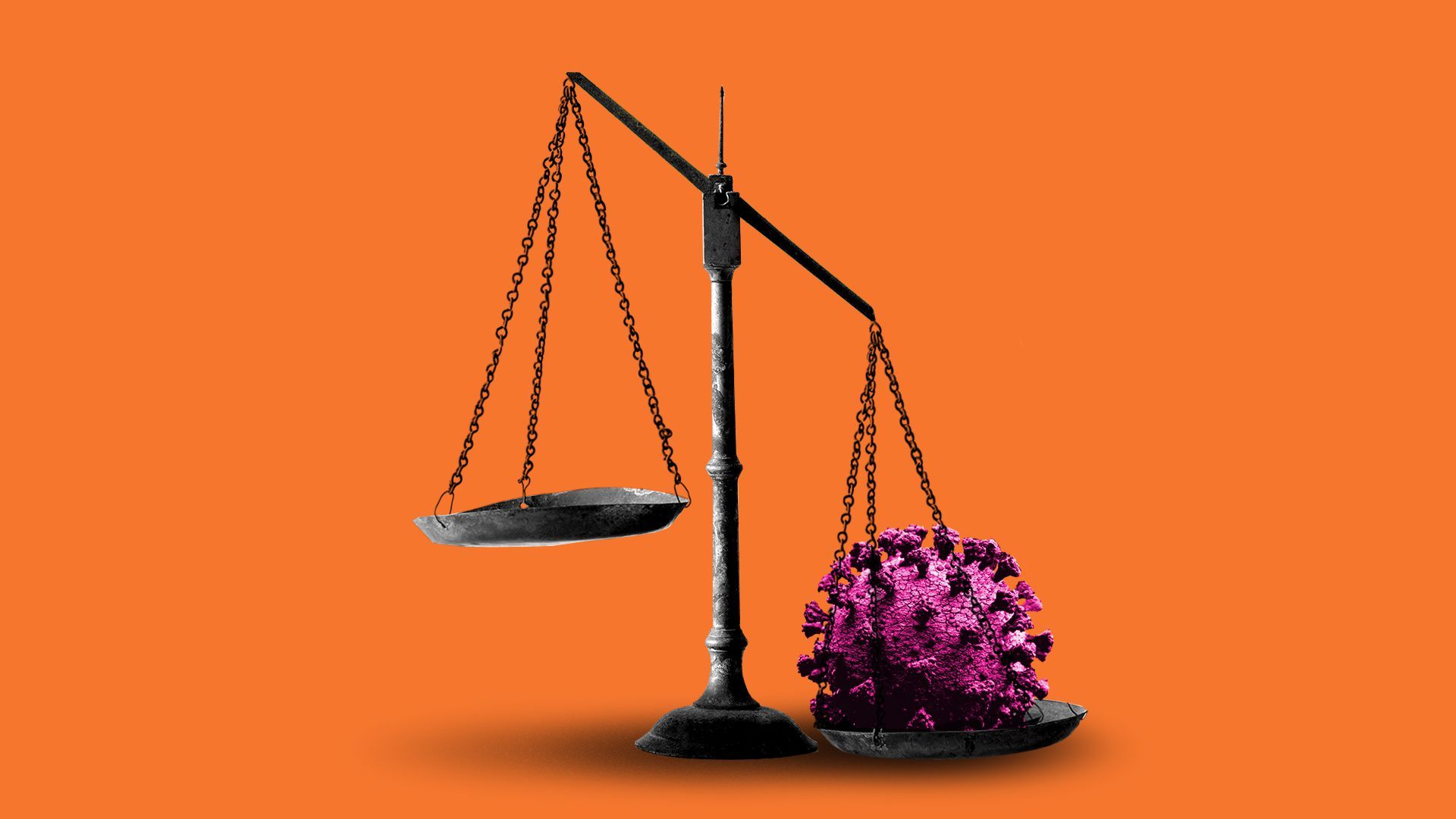COVID-19 is accelerating an unfair future
Add Axios as your preferred source to
see more of our stories on Google.

Illustration: Annelise Capossela/Axios
The coronavirus pandemic is revealing entrenched inequalities in everything from health care to economic opportunity.
Why it matters: The growing sense that there is something fundamentally unfair about American life is one of the biggest challenges the country faces. If COVID-19 is permitted to widen those inequalities unchecked, the political and economic ramifications could be dire.
Driving the news: After an unprecedented course of treatment that included an experimental therapy, President Trump returned to the White House from Walter Reed hospital this week, proclaiming on Twitter: "Don’t be afraid of Covid. Don’t let it dominate your life."
- While few would argue the president of the United States doesn't deserve world-class medical treatment, it did not escape notice that few if any of the 7.5 million Americans who have been sickened by COVID-19 received such assistance in their fight against the coronavirus.
- A New York Times investigation estimated Trump's treatment so far would have cost more than $100,000 in the American health care system.
- "A portion of the people who are severely symptomatic don't have access to health care," Josh Barocas, an infectious disease physician at Boston Medical Center, told STAT News. "And they are the population that is just being decimated by this."
Details: The Kaiser Family Foundation has found the COVID-19 death rate is more than twice as high for Black patients and almost twice as high for American Indian and Alaska Native patients.
- The same data showed roughly 35% of patients with household income under $15,000 became seriously ill, compared to 16% of patients with income over $50,000.
- Uninsured coronavirus patients may end up costing hospitals more than $40 billion.
- The elderly have made up the vast majority of COVID-19 deaths, and the very fact that their deaths are seen by some as less important represents a kind of inequality of empathy.
Between the lines: There's no greater inequality than who lives and who dies, but the economic impact of COVID-19 has been just as unfair.
- 865,000 women dropped out of the labor force between August and September — four times the number of men who left the workforce. That's the opposite of what happened during the last recession, when men lost jobs at a much higher rate than women.
- The ratio of Black to white unemployment rose from 1.27 in April to 1.97 in August, meaning that Black Americans were out of work at nearly twice the rate of white Americans.
- The COVID-19 recovery is likely to be the most unequal in history, writes William Galston in the Wall Street Journal. The number of jobs for the top 25% of earners is now higher than it was before the pandemic, while for the bottom quarter — especially in low-wage service sector work that can't be done remotely — jobs are lower by more than 20%.
Situational awareness: Should further stimulus spending be put off until after the election — as President Trump seemed to argue yesterday, before apparently changing his mind — the recovery gap will likely worsen.
Perhaps nowhere is the unfairness of COVID-19 more apparent than among children, the one age group in America that has no direct political voice.
- Most public school districts around the U.S. are relying at least partially on remote schooling, and with cases still high and winter on the way, the situation seems unlikely to improve.
- But the burden of the COVID-19 schooling failures is falling disproportionately on Black and Hispanic students, who are three times more likely than white students to start the school year remotely.
- The long-term economic effects for the U.S. of millions of students losing access to decent education could run to the trillions. But past historical examples like the London blitz in WWII and Hurricane Katrina indicate that individual students who lose months or more of schooling may never fully recover.
Be smart: It would be a mistake to imagine the weight of this unfairness will go unnoticed.
- Humans share a deeply ingrained sense of fairness, and seeing perceived injustice can even light up certain parts of the brain.
- The pervasive sense of injustice around the 2008 recession helped fuel a global populist wave that has yet to fully ebb.
- The longer the economic pain from COVID-19 lasts, the greater the chance that jobs will be lost permanently, especially as businesses use the crisis to invest in automation.
The bottom line: The U.S. was already facing a future where a combination of technology and policy threatened to lock the country into ever-worsening inequality. Now the pandemic may be accelerating the arrival of that future.
